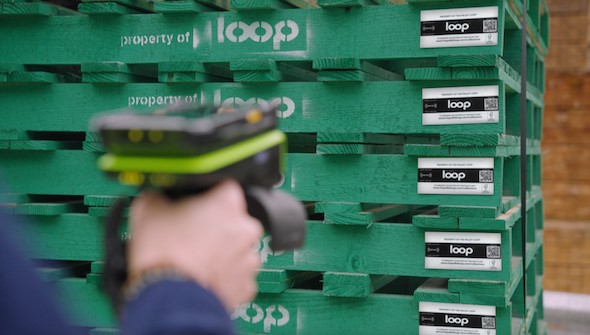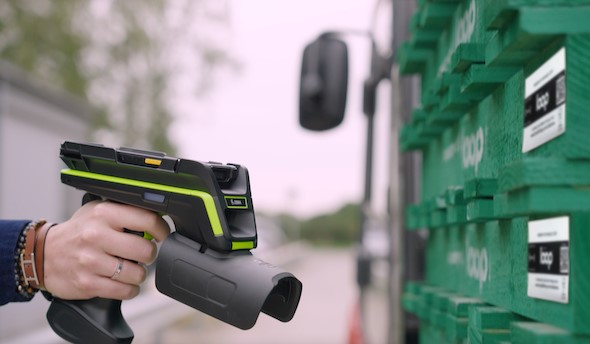Pallets RFID Tagged in Smart Approach
13th March 2024

In an industry first for the UK, The Pallet LOOP today announces that each reusable green pallet it produces and puts into the sector will be fitted with a radio frequency identification (RFID) tag – a move that is set to generate huge amounts of data about the movement of pallets and associated building materials nationwide as they pass through the supply chain.
Equipping each of its pallet with an RFID tag, containing a small chip, will give The Pallet LOOP the ability to scan pallets in and out of its production and collection sites nationwide. For The Pallet LOOP, this investment will give the business accurate, up to date information about the number of pallets issued to customers and, more importantly, collection and recovery rates. Crucially, for users of The Pallet LOOP, the information will also prove invaluable – revealing fascinating insights about the financial and carbon savings they are achieving. Long-term, all building products users through the construction supply chain could access information about pallet and associated product dwell times, setting them on a course to achieving greater efficiencies.
As part of its offer, The Pallet LOOP provides all its customers with access to a special reporting platform, where they can view and download information about the number of pallets returned and the money saved on collections versus disposal via a skip. The system also provides information about the amount of carbon saved and trees repurposed, which can be used in sustainability reporting. This data can be automatically e-mailed to customers or can be generated manually – depending on requirements.
The Pallet LOOP’s RFID technology is being supplied by MiTEQ – a specialist business providing fully integrated automation and tracking solutions using RFID technology. The Pallet LOOP has ordered more than a million tags for the circular economy pallets it is producing, which are due to hit the building materials supply chain in the coming months.
Commenting, Steve Ottaway, Chief Operating Officer (COO) at The Pallet LOOP said: “When we launched The Pallet LOOP, our main objective was to solve the problem of pallet waste by providing a range of pallets that are stronger, standardised in their design, and suitable for reuse. However, we also knew there was an opportunity to make our pallets smarter. In supply chain management and logistics, data has always been king. That’s now also the case for sustainability – with companies needing facts and figures to incorporate into their ESG work and annual reports. LOOP customers already using our PowerBI reporting platform love the detail it provides about the single use pallets we are collecting from their sites. This information will be further enriched when our green pallets, tagged with MiTEQ’s RFID technology, hit the market.”
Alex Whiting, Managing Director for MiTEQ, said “The Pallet LOOP’s investment in RFID is a testament to the power of the technology, not only for managing millions of assets within the business but to supporting a longer-term sustainability goal to reduce wastage and create a stronger circular economy that delivers value for customers. MiTEQ’s unique innovation process enabled us to really explore and understand The Pallet LOOP team’s requirements, collaboratively develop a solution and test it. We are now excited to deploy it into the market.”

Once fitted to the pallets, MiTEQ RFID labels – which are robust, waterproof and abrasion resistant – can be read either by a hand-held or a static scanner employed at manufacturing and repatriation sites. Tags utilise unique ID numbers for the pallet, which allow for the tracking of customer shipments, pallet returns and to identify where the pallet was made and originally delivered. The system can scan and read multiple tags simultaneously, from a distance of at least three metres, enabling The Pallet LOOP to quickly scan pallets in and out, on vehicles, or in stacks on site.
read more

